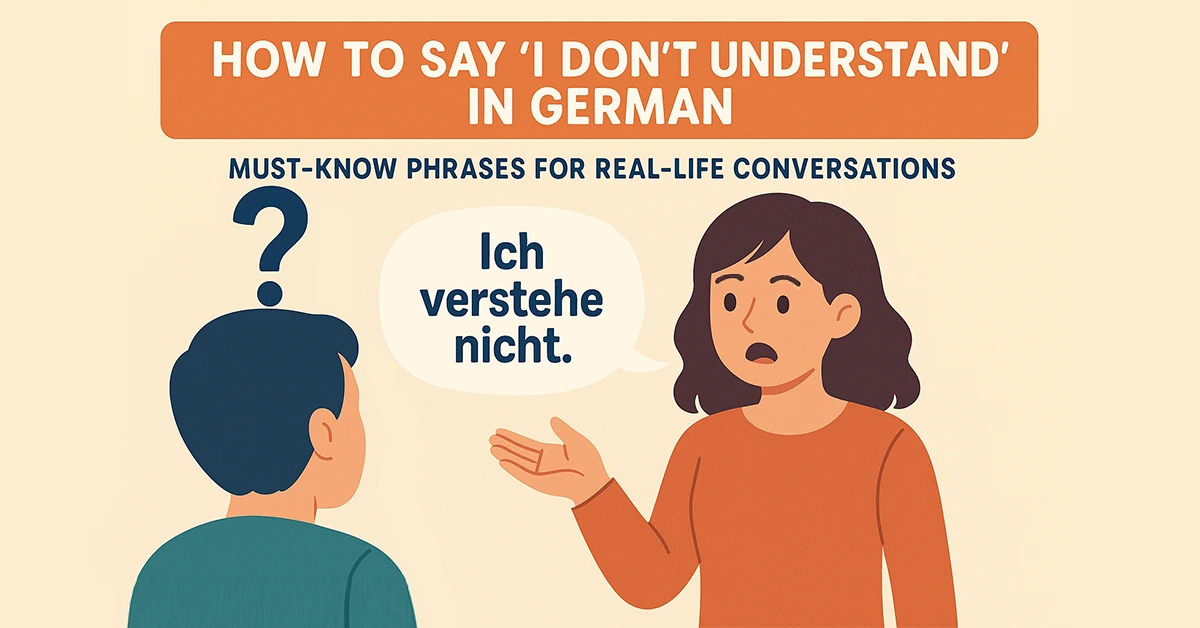How to Say “I Don’t Understand” in German – Essential Phrases

Learning how to say “I don’t understand in German” is essential for beginners. It helps you handle real-life situations when you’re lost in conversation. This guide will give you the key phrases, pronunciation help, and example dialogues to boost your confidence.
Why You Should Learn to Say “I Don’t Understand” in German
When you start speaking German, you’ll often find yourself confused. That’s totally normal! Knowing how to say “I don’t understand in German” allows you to ask for help, keep the conversation going, and learn more in the process.
Core Phrase Breakdown: Ich verstehe nicht
Ich verstehe nicht means I don’t understand.
- Ich – I
- verstehe – understand (from the verb verstehen)
- nicht – not
Pronunciation (IPA): [ɪç fɛɐˈʃteːə nɪçt]
Example: Ich verstehe nicht, was du meinst. – I don’t understand what you mean.
Polite Alternatives: More Respectful Ways to Express Confusion
- Entschuldigung, ich habe das nicht verstanden.
Excuse me, I didn’t understand that.
[ɛntˈʃʊldɪɡʊŋ ɪç ˈhaːbə das nɪçt fɛɐˈʃtandn̩] - Könnten Sie das bitte wiederholen?
Could you please repeat that?
[ˈkœntn̩ ziː das ˈbɪtə ˌviːdɐˈhoːlən]
Useful Follow-Up Phrases: How to Ask for Help or Repetition
- Wie bitte? – Pardon? / What did you say?
- Können Sie das langsamer sagen? – Can you say that more slowly?
- Was bedeutet das? – What does that mean?
Real-Life Scenarios: When and How to Use “Ich verstehe nicht”
At the bakery:
Customer: Ich verstehe nicht, was „Streuselkuchen“ ist.
(I don’t understand what “Streuselkuchen” is.)
In a classroom:
Student: Ich verstehe nicht, können Sie es bitte erklären?
(I don’t understand, can you please explain?)
Tips to Stay Calm and Improve Comprehension
- Take a deep breath and don’t panic.
- Politely ask for repetition.
- Use gestures or point if needed.
- Listen for familiar words or context clues.
Common Mistakes to Avoid When Saying “I Don’t Understand” in German
- Using “verstehen” without “nicht” – that changes the meaning completely.
- Using informal language in formal settings (e.g., use “Sie” instead of “du”).
- Pronouncing “verstehe” as if it were English – the German “v” sounds like “f”.
“Ich verstehe nicht” vs. “Ich habe nicht verstanden” – What’s the Difference?
Ich verstehe nicht – I don’t understand (right now, present tense).
Ich habe nicht verstanden – I didn’t understand (past tense).
Use the second phrase when something has already been said and you missed it.
Pronunciation Tips for “Ich verstehe nicht” and Similar Phrases
- Practice saying the “ch” in “ich” – it’s soft, like hissing.
- “Verstehe” ends in “-e” – don’t drop it when speaking.
- Repeat out loud: [ɪç fɛɐˈʃteːə nɪçt]
Practice Dialogue: Asking for Clarification in German
Person A: Morgen fahren wir um acht Uhr los.
Person B: Entschuldigung, ich verstehe nicht. Was haben Sie gesagt?
Person A: Ich habe gesagt, dass wir um acht Uhr fahren.
Person B: Ah, danke!
Printable PDF: Essential Phrases for When You Don’t Understand German
Download our free PDF with all these key phrases and example dialogues to carry with you or study offline. It includes the main phrase “I don’t understand in German” with IPA pronunciation and usage tips.
Final Thoughts: Keep Learning Even When You’re Lost
It’s okay to feel confused – it’s part of the journey! Every time you say “Ich verstehe nicht,” you create a learning opportunity. Use it with confidence and stay curious.
Conclusion: Mastering “I Don’t Understand” Helps You Keep Going
Knowing how to say “I don’t understand in German” is more than just useful – it’s empowering. With the right phrases, you’ll never get stuck for long. Keep practicing, and soon you’ll understand more and more each day!